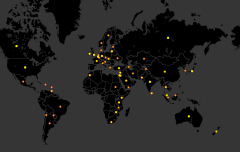How I Got Hired: Trade and Logistics Officer, Global Alliance for Trade Facilitation
My name is Loren Hall, I’m a graduate of the International Trade and Economic Diplomacy degree. Currently employed as a trade and logistics officer with the Global Alliance for Trade Facilitation. The job that I’m in now is absolutely what I wanted when I went to graduate school.
Video




